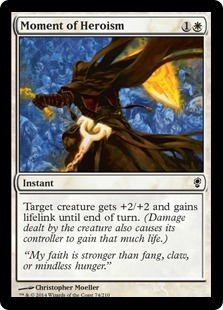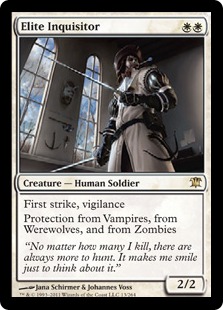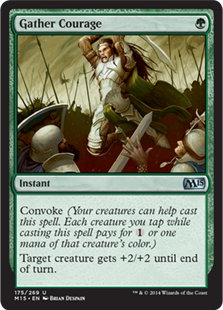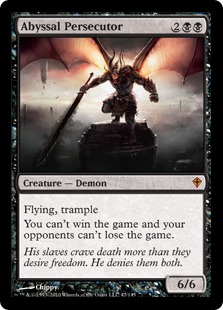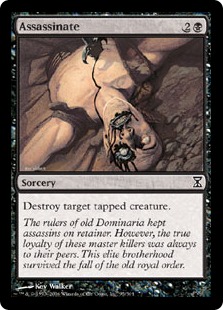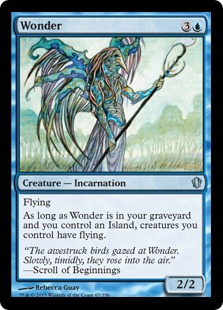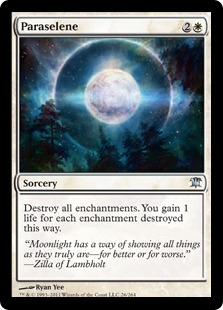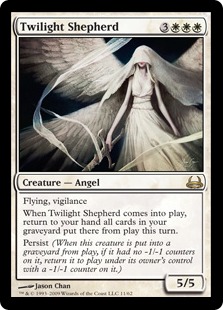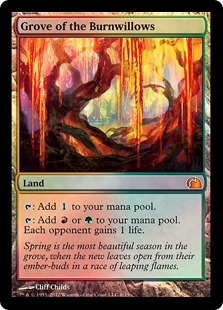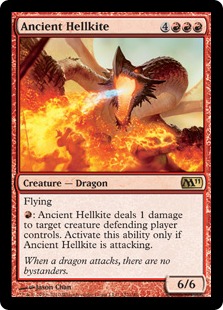Today we have a guest post by Mr. Pierce Oka — showing us how flexible Superversiveness truly can be!
This post first appeared at Pierce's blog Dragon's and Dogma.
Magic: The Superverting,
or,
Superversion isn’t just for literature anymore
By Pierce Oka
In middle school, my friend Ethan introduced me to what would become my favorite game of all time, Magic: The Gathering. I had heard about it here and there before; it was an “older kids” game by the same people who made my Pokemon cards, but I had never seen it. We had a blast with it for a brief time. Every few years I would return to it briefly, but it wasn’t until college that I found a group to play with consistently. Presently, I’ve competed in a Games Day, a prerelease, and a Pro Tour Qualifier, and play competitively on a semi-regular basis; Magic is my favorite tabletop game, bar none. Yet, from the handful of games I played in my youth, why did I keep returning to this game, even when I had barely anyone to play it with? The excellent design and enjoyability of the game is a satisfactory enough answer, but I believe there is something more. Truth. That which mens’ minds and hearts are naturally drawn to with an inexorable force. To borrow a phrase from Tolkien, I believe Magic, like all great works with enduring appeal, contains in it a splinter of the Light, whose shining beckons to something deep in the hearts of all men, even if they do not realize it. Yet this Light is indeed splintered, refracted, “to many hues, and endlessly combined
in living shapes that move from mind to mind”. The full Light would be too powerful, too blinding. Few, if any, could approach. Many might flee it. So the Light goes out in the guise of a fairy-story wizard, gathering a crowd with fantastical displays of fireballs and fairies, conjurings of goblins and great beasts; and with the crowd so enthralled, imparts a bit of itself to them. In a word, I believe Magic: The Gathering is superversive.
Superversive is a term coined by essayist Tom Simon in The Art of Courage as an antonym to subversive. Superversion is, he proposes, the proper response to combat the subversion of morality and truth that has been occurring in the arts over the past decades. We must write stories praising and uplifting that which is good and true, stories about courage, and these must be stories, not sermons, for one only preaches sermons to an already invested congregation. Anyone can read a story.
So far, the Superversive Movement has been a literary movement. I propose there is no reason why it should not also branch out into other forms of art and media, and offer Magic: The Gathering as an example of a superversive game. Authoress L. Jagi Lamplighter offered three marks of a superversive story that, with modification, can be used to assess whether or not a game is superversive. Lamplighter’s three signs are:
1.A Superversive story has to have good storytelling.
2.The characters must be heroic.
3.Superversive literature must have an element of wonder.
My three signs, modified for games (tabletop, video, or otherwise):
1.A Superversive game has to have good gameplay. It must be fun to play, and, ideally, be well designed.
2.Heroism must be praised. I say the game must promote heroism, rather than that the characters must be heroic, because in games, the decisions of the characters rest in the hands of the player, and a game can often demonstrate the goodness of heroism despite, or even because of, a player’s decision to have a character act in an unheroic manner (for example, Bioshock, or Telltale Game’s Walking Dead games).
3.Superversive games must have an element of wonder. To quote Lamplighter:
Specifically, the kind of wonder that comes from suddenly realizing that there is something greater than yourself in the universe, that the world is a grander place than you had previously envisioned. The kind of wonder that comes from a sudden hint of a Higher Power, a more solid truth.
There might be another word for that kind of wonder: awe.
I would also ponder these words of Lamplighter’s husband, and fellow Superverter, John C. Wright. Here he is using the word poetry in a broader sense to refer to all forms of story, and so I would apply these words to superversive gaming:
It is not natural (that is, not instinctive) for a boy to feel it is sweet and decorous to die for the ashes of the fathers and the altars of the gods; but this must be inculcated into him, along with a sense of honor that forbids him to steal even when he is hungry and even when no one is looking. Otherwise, in a land of no patriots where all theft is licit, the soldiers will not march and the workingmen will not work.
Poetry, when it is licit, is the attempt to train the young imagination to prefer fit and decent metaphors and images, and to have the decent and apt emotional reactions to objects, concepts and events he may encounter.
Now, I said I believed that part of Magic‘s enduring appeal is its superversive nature. How does it stack up against these criteria?
1.Good gameplay.
Magic passes with flying colors. The longevity of the game (20+ years), its comprehensive rulebook, legions of players, popularity of competitive level play, and depth of strategic scholarship all attest to the strength of Richard Garfield’s original game design, and work of all those who came after him. Let any who doubt give the game a try.
2.Promotes heroism, goodness, truth, etc.
Let’s take a stroll through the Gatherer, and see how Magic treats of such things as heroism, courage, and the forces of goodness (all images from Wizards). I’m limiting myself to seven cards here, but where they have come from, there are many more.
- When was the last time an Inquisitor was the good guy?
- Or a saint a character?
- They’re not all white cards from Innistrad
- Some of them are green
- Few other fantasy games even touch on grace, let alone make it awesome
Heroism, courage, and goodness are common themes in Magic, and are always depicted positively. But, some might object, does not Magic also depict such things as demons, death, necromancy, and the undead? Does not putting these things in the hands of players as resources to win the game with count as subversion? On the contrary, I would argue that both the inclusion of these things in the game, and the way in which Magic depicts them, contribute towards its superversive nature. To quote from the newest member of the Superversive Movement, April Freeman:
But it’s not only about the good and the light. To have a story you must have conflict, so there must be struggle and darkness. The light must have darkness to fight against. For that is the reality of the world.
Let us consider how Magic depicts the forces of darkness, both artistically, and mechanically. Is there any danger of confusing the good with the bad? Is evil clearly depicted as such? (all images from Wizards)

The classic demon card, now with flavor text to really ram home just how dangerous working with this fellow is. Note use of classical imagery. No sexy, sympathetic demons here.
- In general, demons all come with some kind of downside, some more extreme than others
- Heck, this fellow’s name is a cautionary tale in and of itself. It really doesn’t get more stereotypically medieval than that.
- The villain designs draw from classic imagery that make no bones about the bad guys being bad guys
- Edward Cullen this is not
I do admit that the darkness may be too much for some, but I believe that on the balance, the depictions are consistent with the reality of things, and serve by contrast to make the good things shine all the brighter. What good is an Elite Inquisitor without any vampires to stake?
3.Wonder
Joke aside, an element of wonder can be found in Magic in two ways. The less common way is for gameplay to just happen to work out in a way that creates a scene of awe. Example: I play Army of the Damned, you drop a Sunblast Angel on me the next turn, driving them away in blaze of angelic glory. In the course of the hobby, such occurrences are rare (unless, I suppose, one tinkers one’s decks to lend themselves to such occurrences. I built a rather nice Catholic-themed humans and angels deck I enjoy playing), thus making them even more special. However, the chief way in which Magic achieves a sense of wonder is through its excellent art direction. There is beauty to be found here, and leaps of imagination into far off lands. Nothing quite inspires awe so much as beautiful vistas and fantastic creatures. I tip my hat to Magic, and SFF gaming in general, for keeping classical realism alive and in the hands of the common man in the face of so much 21st century ugliness. The following images, I do believe, speak for themselves (all images from Wizards).
The counsel for superversive Magic: The Gathering rests its case. Fellow members of the Superversive Movement, what say you?
For more from Pierce, visit his blog.
I recommend in particular, his extremely funny review of The Hobbit: Desolation of Smaug.

